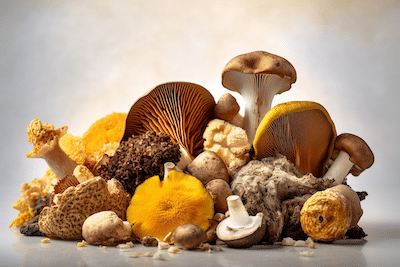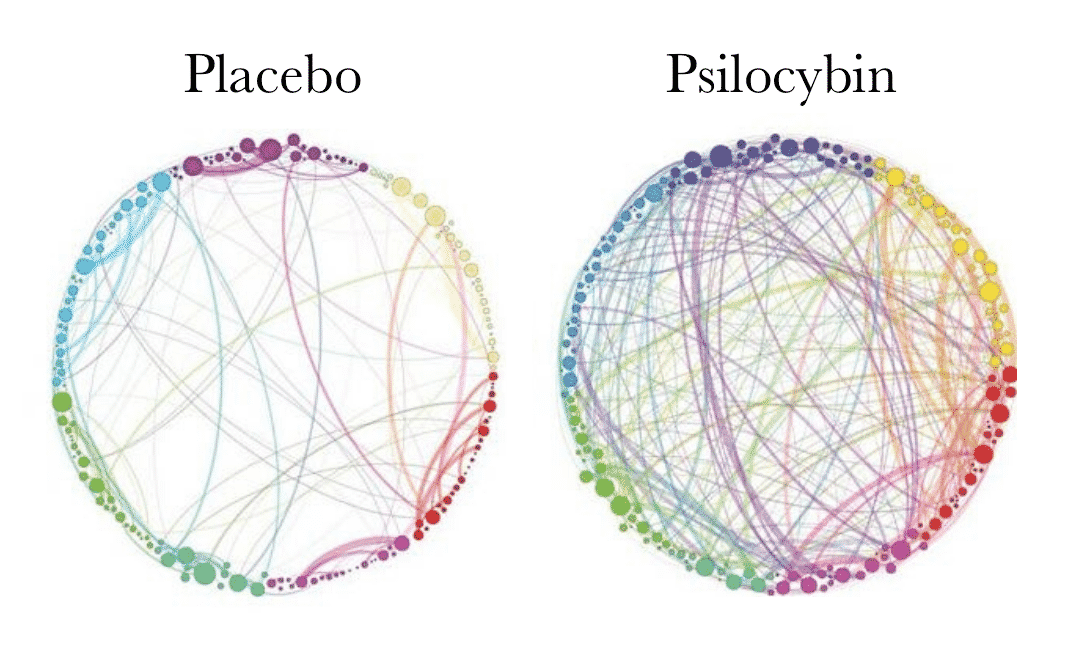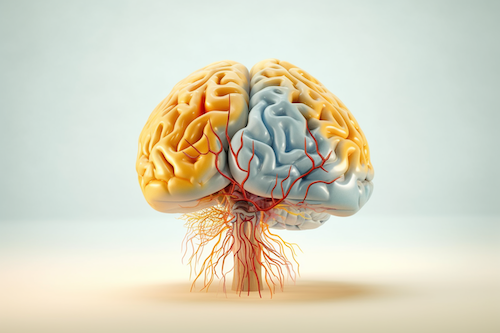Medicinal mushrooms have long been celebrated for their therapeutic properties. Beyond their renowned mental health effects, these fungi possess significant potential in maintaining and enhancing brain health. Scientific research has revealed that certain mushrooms, including psilocybin mushrooms, offer neuroprotective benefits and promote cognitive function. In this article, we will delve into the fascinating world of medicinal mushrooms and their impact on brain health.
Key Takeaway
- Medicinal mushrooms, including psilocybin mushrooms, have neuroprotective properties and can help prevent chronic inflammation-induced damage in the brain.
- Psilocybin mushrooms show potential in protecting against neurodegenerative diseases such as Alzheimer’s, Parkinson’s, ALS, and MS.
- Psilocybin mushrooms can enhance cognitive functions like decision-making, learning, memory, creativity, and problem-solving.
- Other medicinal mushrooms, such as Lion’s Mane, Chaga, Reishi, Turkey Tail, and Shiitake, also offer brain health benefits and can reduce the build-up of harmful protein plaques in the brain.
- Combining psilocybin mushrooms with other medicinal mushrooms, like Lion’s Mane, can enhance neuroplasticity and cognitive effects.
- When consuming medicinal mushrooms, it is important to source them from reputable suppliers and consult a healthcare professional if needed.
- Medicinal mushrooms do not provide a cure for neurodegenerative diseases but can support brain health and potentially mitigate certain symptoms.
- Medicinal mushrooms can be consumed in various forms, including extracts, powders, capsules, teas, and can even be grown using high-quality mushroom grow kits.
Medicinal Mushrooms and Neuroprotection

Chronic inflammation is associated with various neurodegenerative diseases, including Alzheimer’s disease, Parkinson’s disease, ALS, and MS. Psilocybin mushrooms have demonstrated the ability to reduce the production of proinflammatory mediators, thereby preventing inflammation-evoked damage in the brain.
A study conducted at the University of Pretoria found that four different psilocybin mushrooms effectively decreased the production of these mediators, offering potential protection against neurodegenerative diseases.
Moreover, psilocybin mushrooms have shown protective effects against oxidative stress, a process linked to cell death and nervous system diseases. Research using human cells revealed that Psilocybe natalensis, a magic mushroom strain, reduced markers of oxidative stress. This highlights the potential of psilocybin mushrooms in preserving brain health.
Psilocybin Mushrooms and Cognitive Benefits
Cognition, the process of acquiring knowledge and understanding through thought, experience, and the senses, can be enhanced by the neuroprotective effects of psilocybin.
By maintaining optimal conditions in the brain, psilocybin facilitates improved decision-making, learning, and memory.
Furthermore, the activation of neuroplasticity and entropy by psilocybin may enhance the brain’s ability to learn new information, foster creativity, and improve problem-solving skills.
 Image source: Synthesis
Image source: Synthesis
Other Medicinal Mushrooms for Brain Health and Cognition
While psilocybin mushrooms offer unique benefits, many other edible mushrooms also contribute to brain health and cognitive function. These mushrooms contain essential anti-inflammatory and antioxidant compounds, and some have been found to reduce the accumulation of beta-amyloid plaques, harmful protein deposits in the brain associated with neurodegenerative diseases.
Notable mushrooms recognized for their brain benefits include Lion’s Mane, Chaga, Reishi, Turkey Tail, and Shiitake. Some individuals who practice microdosing may combine these medicinal mushrooms with psilocybin to maximize their cognitive effects.
For instance, Lion’s Mane, known for its neurogenic properties, can be taken alongside psilocybin to enhance neuroplasticity. This combination, along with niacin to increase blood flow, is commonly referred to as a Stamets’ Stack.
FAQs
Q1: Are medicinal mushrooms safe for consumption?
A1: Generally, medicinal mushrooms are safe for consumption when sourced from reputable suppliers. However, it is important to exercise caution and consult a healthcare professional before incorporating them into your routine, especially if you have pre-existing medical conditions or are taking medications.
Q2: Can medicinal mushrooms cure neurodegenerative diseases?
A2: While medicinal mushrooms exhibit neuroprotective properties and may help prevent or slow down the progression of neurodegenerative diseases, they do not provide a cure. These mushrooms can support brain health and potentially mitigate certain symptoms associated with such diseases.
Q3: How can I incorporate medicinal mushrooms into my daily routine?
A3: Medicinal mushrooms can be consumed in various forms, including extracts, powders, capsules, and teas. Additionally, some individuals choose to grow their own mushrooms using high-quality mushroom grow kits, providing a reliable year-round supply. It is advisable to follow dosage recommendations and guidelines provided by reputable sources.
Conclusion
Medicinal mushrooms, particularly psilocybin mushrooms, offer significant benefits for brain health and cognitive function. Their neuroprotective effects, ability to reduce chronic inflammation, and potential to enhance cognitive processes make them a fascinating area of research. While psilocybin mushrooms stand out for their unique properties, a variety of other mushrooms contribute to brain health and cognition. By exploring the potential of medicinal mushrooms, individuals can take proactive steps towards maintaining optimal brain function and overall well-being.


